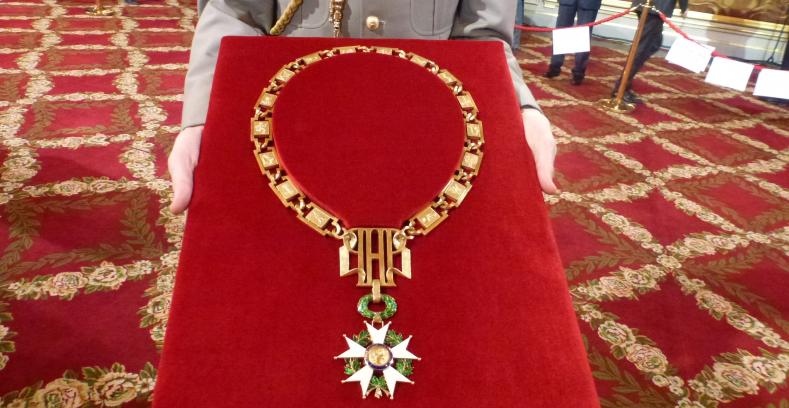
The mission of the Legion of Honor
The Legion of Honor is part of the national patrimony. A living, popular and contemporary institution, it embodies strong values tied to the history of France.
Whether a subject of aspiration, criticism, or jealousy, whether it fascinates or annoys, the Legion of Honor always stimulates the same degree of interest after its two centuries of existence.
Forged by the ups and downs of history, the Legion of Honor has survived changes of regime; it has overcome controversies and has adapted to social changes.
Let us decipher this emblem of French identity under five headings:
1. A national emblem
In a world losing its points of reference, the Legion of Honor remains a strong, understandable and unifying symbol. It is deeply anchored in French society.
The Legion of Honor is one of the world’s most widely recognized decorations. It has often served as a model to many foreign countries.
2. Faces of France
The Legion of Honor brings together, around the criterion of personal merit in the service of the nation, famous personalities as well as citizens unknown to the broader public.
Each new cohort of honorees tells the story of the nobility of individual actions or of professional and social accomplishments that sketch out the contours of our collective greatness.
The Legion of Honor celebrates the civic spirit of France and her sense of common interest.
3. The melting pot of the Republic
The Legion of Honor has a universal calling: to reward both military and civilian merit.
Honorees strive for the progress of France, for her renown, for her defense.
Each one brings his or her talent to bear for the common welfare and expresses it in a particular field: military service but also accomplishments in the areas of economy, science, education, the arts, sports, or else in judicial, diplomatic or elective office….
4. The reflection of the era
The Legion of Honor bears witness more broadly to technological upheavals, social evolution and economic competition. It reflects scientific challenges, great humanitarian causes, or achievements in sports.
It was General de Gaulle who, in the 1960’s, opened the Legion of Honor up to recipients of gold medals in the Olympic Games, thus commemorating the importance of the values of sports in contemporary society.
Similarly, honorees are currently chosen to better represent the economic world and to include entrepreneurs, engineers, researchers, technicians, the liberal professions and leaders in the digital economy.
5. An order moving ahead
The Order of the Legion of Honor is evolving to better adapt to the reality of our time.
In 2007, new guidelines were adopted to make the discovery of potential honorees even more rigorous. Parity in the number of men and women was put in place ans s special class was created for volunteer work in non-profit organizations.
Citizen initiative was instituted, permitting French nationals to propose, according to strict procedures, an individual whom they consider meritorious and who has not previously come to the ministers’ attention.
In 2017, the national Orders reform reaffirms the principles of universal recognition and individual merit of the Legion of Honor and leads to a reduction of people awarded.